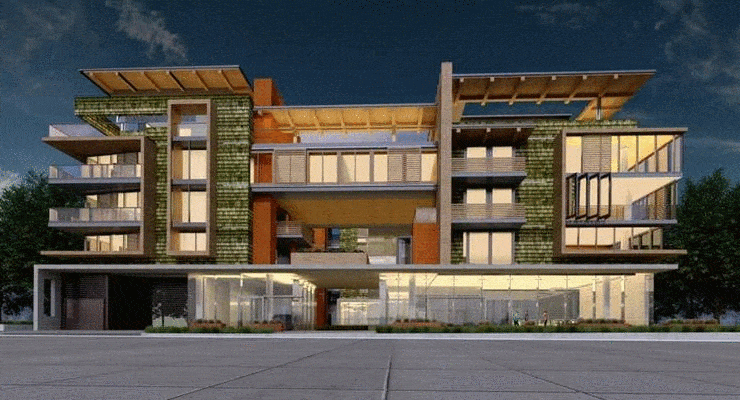
[Updated] Opponents of two large development projects which rely upon state incentives to override local city control of housing construction are heading into uncharted territory Monday in their efforts to resist the California housing crisis-driven mandates.
The opponents have raised enough hackles to get reviews before the City Council tonight.
Both development projects — one planned for South Robles Avenue and another for North Madison Avenue — will be considered and decided upon separately, but are similar in nature. Councilmembers will play a judicial role rather than an unfettered decision-making one, as they will be focused on deciding if the developers’ projects meet the conditions required to obtain the concession permits originally granted.
“The problem is, even if we agree with the opponents there may not be anything we can do,” said City Councilmember Andy Wilson. “We have to follow state law.”
Indeed, Mayor Terry Tornek suggested the City Council’s role will be somewhat technical; reviewing and ensuring that the documents submitted by the applicant are correct in all their particulars.
“We’ll be making sure the City is doing an adequate job in terms of reviewing,” the Mayor explained. “Making sure that what’s being asked for is actually being earned. And it’s not as simple an answer as you might think. These are complicated measurements with a lot of different requirements. Some of them may even have been in conflict one with another. So it’s a very challenging piece of business and the stakes are quite high.”
Wilson noted that in the past similar development projects have routinely been granted what is called an “Infill Exemption,” which allows the developments to avoid intensive California Environmental Quality Act, or CEQA, reviews.
There is an exemption from full CEQA review provided under state law where projects classified as “infill” are concerned. While those are still subject to a CEQA review, the review is of a reduced, expedited kind. Both projects under discussion Monday night have obtained the Infill Exemption and opponents want them revoked.
In questioning the appropriateness of granting this exemption for the two developments at hand, the appellants may be testing out a new strategy.
“I think these appellants are saying, ‘Hey, there are significant environmental issues and they should have to go through a CEQA review.’ I think it’s become a CEQA question,” Wilson said.
One prominent Pasadena preservation organization seems to agree.
In a July 19 e-mail, Pasadena Heritage urged its supporters to contact their City Council representative or speak tonight “requesting that the City Council not approve the requested permits and special concessions for this major mixed-use project [the North Madison Avenue one, in this case] until an environmental impact report is done to adequately study the proposal, its potential impacts, alternatives and mitigation measures.”
Ordering an in-depth environmental review is far from an automatic deal-killer, however, Wilson noted. “It is just another step that would have to be taken, in order for these projects to be adequately reviewed.”
If a project takes up less than five acres of urban use space, doesn’t threaten endangered species, has a less-than-significant impact on its surroundings, and can be served by local utilities, then it’s generally considered Infill.
But there is one other criterion for the Infill classification that is less clear-cut in these cases. That is the requirement a project be consistent with the City’s General Plan designations and policies.
Both projects are, presently, beneficiaries of affordable housing concession permits. The way they work is, if a developer builds low-income units into a project, they can get breaks from City zoning requirements.
In the case of the two developments before the City Council Monday night, each is permitted to be taller and fatter than the General Plan would normally permit.
It would appear the scale of the projects triggered neighborhood opposition that has, to date, failed to stop their progress.
In the case of Zhuang & Zhong Los Robles, LLC, the maximum number of units allowed for the project is 71, but the code allows for an increase in that number, provided a number of the units are designated for affordable housing.
Eight, “very low” affordable housing units have been proposed, qualifying the project for a 35 percent density bonus, kicking the number of total units on the project up to 96, four more than the applicant actually plans to build. The permit also allows the structure to exceed the maximum allowed floor ratio area.
A hearing on the affordable housing concession permits for 253 South Robles Avenue was held in November 2018.
Opponents said the proposed building is too tall; that cumulative traffic impacts needed to be weighed, that the project is inconsistent with the General Plan, that the CEQA exemption is not appropriate due to impacts to a historic resource; and that the project would result in significant impacts on traffic, noise, and air quality, which is the whole gamut of possible offenses.
Nonetheless, the concessions and CEQA exemption were approved.
On Nov. 15, 2018, Madison Heights Neighborhood Association (MHNA) filed with the Zone Board of Appeals citing an incorrect CEQA determination, inconsistency with the General Plan, errors and omissions in the record, and a failure by the hearing officer to consider evidence.
A hearing was held on Feb. 6 of this year and, on April 3, the Board voted 3-0 to approve the concession permits and exemption.
On April 8, Mayor Terry Tornek submitted a request for a call for review of that decision and on April 29 the City Council approved it. City staff has recommended the Zone Board of Appeals decision be affirmed by the Council.
The project at 127 and 141 North Madison Avenue is proposed by developer Mike Balian. It would be five stories high and comprised of 49 dwellings, including four, “very low income” units. There would be commercial outlets and 100 parking spaces at grade level and underground.
Like the Los Robles project, the concessions sought include an increase in the maximum floor area ratio and an increase in the maximum height, in this case from 50 feet to 62 feet.
Also requested was a concession to remove four protected trees and… a CEQA exemption.
During the hearing process, opponents asserted that an existing office building on the property is an eligible historic resource and that, as such, the CEQA exemption was incorrectly granted. The City conducted and analysis that delivered the opposite conclusion.
Pasadena resident Erika Foy, who is also Vice President of the MHNA, followed with an appeal application to the Board of Zoning Appeals that did not prosper at a June 5 hearing. On June 17, Pasadena Heritage, Women’s City Club Pasadena and the Blinn House Foundation, submitted an appeal application to the City Council, which it will now consider.
Here too, City staff is calling for final approval of the concessions and exemption.
Mayor Terry Tornek said he wasn’t sure just how controversial the projects themselves are. He suggested that the root of the opposition might lie with the dismissal of Pasadena’s General Plan requirements in exchange for affordable housing units.
“There’s not a lot of experience with these,” the Mayor told Pasadena Now, “and I think that’s the reason that they’re both coming to the Council.”
Local resident and developer Ken McCormick pointed out in an opinion piece in Pasadena Now last week that the current process is cumbersome.
“Unlike some municipalities, we do not have a regularized process in place yet that requires the City to evaluate a project’s overall consistency with the General Plan policies and zoning and design guidelines before determining that it is eligible to avoid a full CEQA review,” McCormick wrote.
These are not the first projects of their kind, said Tornek. Two others were processed with less fanfare.
“It didn’t seem to be having a big impact in Pasadena and suddenly we had a kind of a rush of them because we have a local developer that’s developed a certain amount of expertise in this area,” he explained. “And developers, once they see somebody have some success, they learn the lesson, and follow suit.”
Tornek said the formula cooked up by the state for granting the concessions is what’s controversial.
“There’s a question about whether the amount of benefit in terms of providing additional affordable housing is really warranted in terms of the density that a project sponsor gets,” he stated. “That’s not within our discretion. That’s what state law did.”
Editor’s note: Neither developer would speak with Pasadena Now to answer questions about these developments.
















